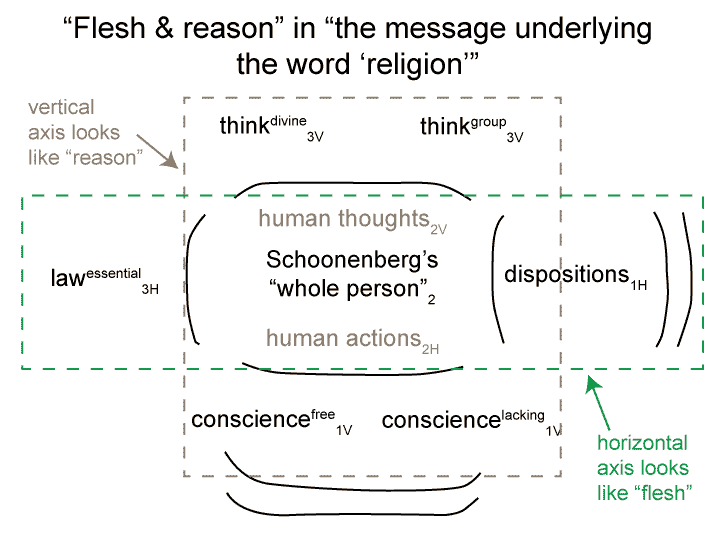Category Archives: Defining Religion
Man and Sin by Piet Schoonenberg (1964) 2.3 CO
[Would Schoonenberg have labeled the same actuality: the whole person?
The conflict between the whole person and God’s revelation is manifest in the double vertical axes.
The horizontal axis remains one. Its normal context is lawessential.
However, one may denote the horizontal axis according to the conditions of the intersecting vertical axis. One can write of lawacceptance or lawdenial, depending on dominance of one or the other vertical axis.]
Man and Sin by Piet Schoonenberg (1964) 2.3 CM
Summary of text [comment] page 82
[Does Schoonenberg’s speculation cohere with Augustine’s concept of original sin?
An Archaeology of the Fall describes one consistency.
Eve, like the rest of us, heard what she wanted to hear.
What did she want to hear?
The serpent talked as if it were a projection of Eve’s unconscious mind.
Does the difference between flesh (passion) and reason capture the serpent’s words?
Or is ‘flesh and reason’ opposed to ‘the spirit of God’s command’?
To me, the latter option prevails.
First, it seems that the latter difference matches the serpent itself. ‘Flesh (presence) and reason (meaning)’ reflect the message underlying ‘the image of a talking serpent’.
Second, consider way the serpent seduced Eve. It started with sensuality and ended with reason.]
Man and Sin by Piet Schoonenberg (1964) 2.3 BH-2
[Paul was not a man given to over-indulgence of the appetites. He did not sell his flesh into bondage for material or sensual pleasure. He was a man given to righteousness.
So what did he do?
He sold his bones into bondage for an immaterial pleasure.
He sold his bones, which, in the Old Testament, long to stand before the Lord in righteousness, to a thinkgroup and consciencelacking that had already taken the metaphor and turned it into an instrument for propaganda.
The Pharisees and the Sadducees were all about ritual demands.
They were the “bones” that held Israel together. They were “bloody” servants of ‘the object that brings all subjects into organization’.]
Man and Sin by Piet Schoonenberg (1964) 2.3 BB
Summary of text [comment] page 81
Schoonenberg quoted St. Paul (Galatians 5:17) in discussing the opposition between flesh and spirit.
[My suggestion is this: Paul struggles against a metaphor that has been repurposed by an (infra)sovereign religion.]
The desires of the flesh [and, now, the bones] are against the spirit.
The desires of the spirit are against the flesh [and the elite ‘bones that support society’].
These statements differ, even though they sound the same.
[Does Paul’s term ‘flesh’ veil a change of meaning of the Old Testament opposition between ‘flesh and bones’ that occurred when the metaphor was usurped by an (infra)sovereign religion?
What a wonderful question.]
Man and Sin by Piet Schoonenberg (1964) 2.3 BA
[Oh, speaking of terminology, I want to suggest the following:
‘An infrasovereign religion’ is one that has not grasped sovereign power and may or may not be in pursuit of sovereign power.
‘An (infra)sovereign religion’ has gained power and has instituted itself as an allied member of a Public Cult.
Most Public Cults (religionsovs) are alliances of (infra)sovereign religions.]
Man and Sin by Piet Schoonenberg (1964) 2.3 AZ-1
Summary of text [comment] page 81
[A similar change in the American language occurs today. The (infra)sovereign religions of Progressivism usurp and tailor the specialized language of Christianity to suit their pursuit of sovereign power.
In particular, the word ‘social’, like the ancient word ‘bones’, has been drained of personal meaning and repurposed for organizational manipulation and control.]
Man and Sin by Piet Schoonenberg (1964) 2.3 AW
Summary of text [comment] page 81
[Elitist (infra)sovereign consciencelacking is more spiritual (thus, more dehumanizing) than the spineless consciencelacking of a person whose flesh is in bondage to seeking pleasure and avoiding pain.
Why?
In the former, interpellation of thinkdivine has been rendered impossible.
Religionsovereign marks the contextualizing of concupiscence by cruelty. Concupiscence requires self-justification. Cruelty requires blasphemy.
Thinkpro-object promotes self-justification.
Hatred of the anti-object produces blasphemy.]

